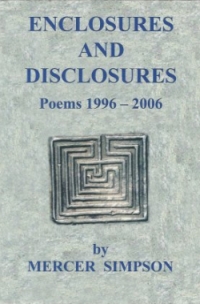Enclosures and Disclosures includes a sequence of poems subtitled "Visions of War". Simpson's visions include "Edward Thomas Looks Through His Periscope" ('they are reciting/unfinished poems/left in diaries/in their dug-outs'), and "After Field Operations: Wilfrid Owen Has a Nightmare in Craiglockhart Hospital" ('Improper advances had been made on many fronts/and there had been reported instances of bleeding...'). This is the fifth and final poem from this section, from the war of words:
Henry Reed Learns Another Lesson of the WarYou can read an excerpt from Enclosures and Disclosures at Rockingham Press, and the book is available for purchase from Amazon.co.uk.
The blank page
has a wall round it:
the guards all in white uniforms
insist, Words shall not pass!
Stop (full stop) and identify yourselves:
admit only one meaning
at a time. Remember, ambiguities
are dangerous, they provoke
revolutionaries to plant their bombs
against the established order.
The weary poets imprisoned inside
scrabbling for words in the blank-faced
snow-white indescribably pure
substitute for earth would prefer
a little dirt to illuminate the human scene.
They are waiting for the guards to admit
words that cross the line, that unhyphenate,
slide off into strange misspellings, come out
in a completely unfamiliar language.
Could it be Esperanto, even if the military
prefer Newspeak? No chance to examine a fresh consignment.
The typewriter has cancelled the invoice.
Now we get the silly old tired words
lined up on the white parade ground,
everything incredibly clean, highly polished.
The regimental-sergeant-major brings the parade
inflexibly to attention. No one dare move.
Everything is equally spaced, with the rhymes
keeping their precise distance at the end
of each line. Now the poem
is marched off into the drill shed
as it's snowing again, and we ought to be
in greatcoats instead of shirtsleeve
order. It's all a whiteout and what we've written
is completely and utterly forgettable.








